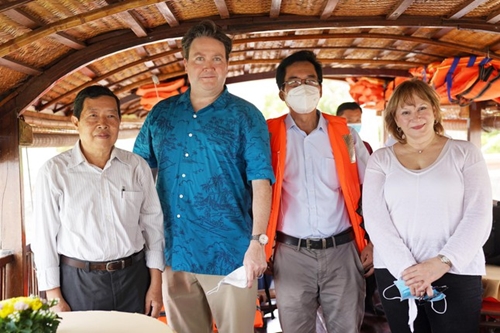Knapper said through the Mekong-U.S. partnership, the U.S. continues to assist countries in the lower Mekong region to promote stability, peace, prosperity, and sustainable development.
    |
 |
|
U.S. Ambassador to Vietnam Marc Knapper (second from left) visiting Can Tho City on April 8 (Photo courtesy: the U.S. Embassy in Vietnam) |
The U.S. Agency for International Development (USAID) in Vietnam is sponsoring a variety of programs on forest management, diversity, and biodiversity conservation, helping the country reduce greenhouse gas emissions and adapt to climate change impacts, he affirmed.
Knapper said to effectively and sustainably mitigate climate change, it is necessary to focus on promoting green and renewable energy, as well as training cooperation programs to raise awareness and improve human resources quality.
He informed that he had a meeting with the board of directors of the Can Tho University to reaffirm the U.S.’s commitment to a partnership focusing on education via people-to-people exchanges.
He was delighted to know that many students from the Mekong Delta choose the U.S. as their destination to study and research, particularly regarding the fields of environment and climate change.
The U.S. is committed to always creating the best conditions possible for Vietnamese students and researchers, the diplomat stated.
On the same day, Knapper attended an opening ceremony of “The Interceptor 003” river cleaning system, a machine that uses solar energy to collect waste on the Can Tho River with a maximum capacity of up to 50,000 kg per day.
Source: VNA